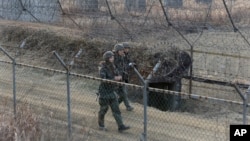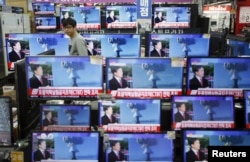North Korean leader Kim Jong Un received an irritating birthday gift Friday when South Korea resumed critical loudspeaker broadcasts along the border area.
North Korea’s military in response has increased the number of forward-deployed troops, and the South’s forces are on the highest possible military alert.
The resumption of these broadcasts using a string of loudspeaker towers stationed along the South Korean side of the demilitarized zone (DMZ) raises the potential for military confrontation with the North.
Britain Friday asked South Korea to refrain from restarting the broadcasts so as not to escalate border tensions.
In August South Korea turned on these broadcasts for the first time in 11 years in retaliation for a North Korean landmine incident in the DMZ. The two sides subsequently exchanged artillery fire and Kim Jong Un declared a “quasi state of war.” But a wider conflict was adverted when both Koreas agreed to end provocations and cooperate on exchanges and reunions of separated families.
Physiological warfare
South Korea says it resumed the broadcasts Friday in retaliation for Pyongyang’s recent nuclear test that Seoul says violated the August settlement.
South Korean officials say the programming is a mix of news and popular K-Pop music, but it reportedly also includes critical commentary about the autocratic North Korean leader’s policies and behavior.
During Friday’s broadcast a South Korean announcer says the North’s nuclear test triggered worldwide condemnation and escalated global tensions.
“North Korea’s nuclear test is a very serious incident, which could drive the Korean peninsula and inter-Korean relation into a crisis," said the announcer.
The Kim Jong Un regime considers these broadcasts to be highly offensive and psychological warfare. North Korea tightly controls the media in-country and portrays the young leader as a near deity. Although in recent years there has been an increase of outside information entering the country through the porous border with China.
South Korea's military also heightened its cyber security alert level Friday. South Korean nuclear power plants reportedly experienced cyber attacks in the past that officials said were caused by North Korean hackers.
The U.S. imposed additional sanctions against North Korea last year after it accused Pyongyang of conducting a massive cyber attack on Sony Pictures Entertainment, allegedly for the company’s backing of a movie, The Interview that portrayed the North Korean leader in a negative light.
Limited options
President Park Geun-hye said Friday that South Korea is taking strong countermeasures against North Korea in close coordination with the international community.
However, South Korea’s punitive economic options are limited. In 2010 South Korea halted most trade and assistance programs to the North after Seoul accused Pyongyang of sinking a South Korean warship and killing 46 sailors. North Korea has denied any involvement in the attack.
South Korea’s Unification Ministry says it will not at this time shut down the Kaesong industrial complex where approximately 120 South Korean firms employ some 53,000 North Korean workers.
"We're not at the stage that we can say whether we will close it or pull out [people]," said Jeong Joon-Hee, South Korea’s Unification Ministry spokesman on Friday.
The United States is pushing for stronger U.N. sanctions on North Korean trade and finance, and banning some North Korean ships from international ports.
For international sanctions to be effective, China - North Korea's main economic supporter - must agree to go along with increased punitive measures.
U.S. Secretary of State John Kerry talked to Chinese Foreign Minister Wang Yi Thursday about the need to take a stronger international stance against North Korea than Beijing had been willing to take in the past.
“I made it very clear; that has not worked and we cannot continue business as usual,” Kerry said.
Some analysts say China could bring intense and immediate pressure to bear by basically shutting down all aid and border trade.
“China needs to lock the oil pipeline or the block flow of goods into North Korea,” said North Korea analyst Ahn Chan-il with the World Institute for North Korean Studies.
But Beijing has been reluctant to take drastic measures that might create instability on its border. While it has denounced Pyongyang’s recent nuclear test, it has not yet made clear if it will support stronger sanctions.
A newspaper of China's ruling Communist Party Friday published an editorial criticizing the "hostile policy" of South Korea, the United States and Japan toward North Korea, suggesting that pressure alone will not convince Pyongyang to give up its nuclear ambitions.
Youmi Kim in Seoul contributed to this report.

